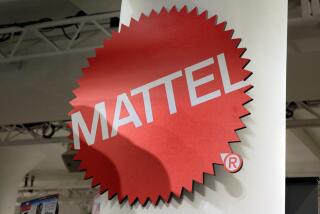Mattel plays diplomat in China
- Share via
The Chinese call it guanxi, and it refers to the relationships that are so crucial to doing business in their country.
To many observers, it helps explain why a high-ranking Mattel Inc. executive appeared with Chinese government officials Friday to publicly apologize for having to recall more than 19 million toys because of lead paint and dangerous magnets.
The toys had been made in China. So why was Mattel eating crow?
“It’s the whole concept of guanxi -- cooperation -- and face saving,” said Mark Allenbaugh, a lawyer who consults with companies doing business in China. “Mattel has developed relationships over the years, with the factories and with government officials. That can all disappear very quickly if Mattel went the other route and blamed the Chinese manufacturers as being the bad guys here.”
Few companies would know better than Mattel about the importance of guanxi.
The El Segundo toy maker imports 65% of its products from China and, unlike most others in its industry, owns the factories there that produce many of its goods.
Because so much of its business is based in China, it’s especially important for Mattel to be on good terms with the Chinese government, noted Allenbaugh, who also owns an Irvine manufacturing company that imports products from China.
“The Chinese government can make it very, very difficult and expensive for a company like Mattel to continue to do business in China,” he said.
But as news of the meeting circulated Friday, Mattel had the difficult task of trying to quell a brewing storm -- a week before Chief Executive Robert Eckert makes a trip to China to personally inspect the company’s new manufacturing safeguards.
“China should be apologizing as well to consumers around the world for exporting shoddy products and dangerous food,” said Sen. Charles E. Schumer (D-N.Y.) in a quickly issued statement.
Placed on the defensive, Mattel said the meeting between Chinese officials and Thomas Debrowski, Mattel’s executive vice president for worldwide operations, had been “mischaracterized.”
A spokeswoman said after the meeting that the company’s appearance in Beijing was no different from similar testimonials before the U.S. Congress and European Union officials.
“Since Mattel toys are sold the world over, Mattel apologized to the Chinese today just as it has wherever its toys are sold,” Mattel said in a statement.
Throughout a series of recalls this year of Chinese-made products, which began last winter with tainted pet food ingredients, Chinese officials have complained that their factories have gotten undue criticism. Consumers failed to consider foreign companies’ lack of oversight, Chinese officials said, or the billions of safe products Chinese factories produce.
“Mattel would do this because they want to keep good relations with China,” said Susan Aronson, a professor at the George Washington University School of Business and an expert in global corporate social responsibility. “Apologizing for a corporate mistake is not common in the United States, but it’s common in other countries, particularly in Asia.”
For its part, Mattel has said repeatedly that its biggest recall had nothing to do with China or shoddy production.
That recall of more than 17 million doll accessories and cars -- coming just after one lead-paint recall of Chinese-made products and in tandem with another -- was because of high-powered magnets that could break loose and pose a serious danger if swallowed.
The problem, Mattel’s Eckert said again and again, was in design, not manufacturing.
The company also has said from the beginning that out of an abundance of caution, it was recalling all products with even the slightest chance of cross-contamination from lead paint.
But according to the official New China News Agency, Debrowski on Friday “admitted” both points.
Further underscoring the issue, the news agency story also said an investigation showed that 87% of the 21 million recalled toys had design flaws, and 13% contained excessive lead.
“Expanding the recall without disclosing the exact proportion of the recalled toys among all its imports isn’t proper,” Li Changjiang, head of the General Administration of Quality Supervision, Inspection and Quarantine, told the news service.
Indeed -- perhaps in deference to guanxi -- Mattel’s statement in China highlighted both the scope of the recall and the source of the magnet problem.
“The magnet-related recalls were due to emerging issues concerning design, and this has nothing to do with whether the toys were manufactured in China,” Debrowski told Chinese officials. “Mattel does not hold Chinese manufacturers responsible for the design in relation to the recalled magnet toys.”
The careful wording differences are a kind of wordplay Chinese officials employ when the country’s interests are at stake, said Drew Thompson, director of China studies for the Nixon Center in Washington.
Thompson compared it to the linguistic battles over Taiwan. The U.S. says, “We do not support Taiwan independence,” and the Chinese say, “We oppose Taiwan independence,” he said.
But after meetings between the two countries on the topic, Chinese officials have said that they are pleased that the U.S. opposes Taiwanese independence.
Given Mattel’s significant investment in China -- making it difficult to quickly shift production elsewhere -- Mattel may have had little choice but to participate in China’s effort to shape the news.
“They had to give a mea culpa to the Chinese government in order to move forward so they can get back to business,” Thompson said. “The Chinese government feels they have been mistreated and haven’t gotten a fair shake from the international media in this situation, and this meeting was an attempt to get a more balanced and accurate perspective circulated.”
Still, Thompson said, the short-term public relations victory could backfire.
“I’m not sure they considered the potential impact this is going to have on future foreign direct investment,” Thompson said. “This incident makes China look like they’re bullying a company that has made significant investments in the Chinese economy.”
“It has struck a nerve here in the States in a way that I don’t think the Chinese government has appreciated.”
--
Times staff writer Don Lee in Shanghai contributed to this report.
More to Read
Inside the business of entertainment
The Wide Shot brings you news, analysis and insights on everything from streaming wars to production — and what it all means for the future.
You may occasionally receive promotional content from the Los Angeles Times.










